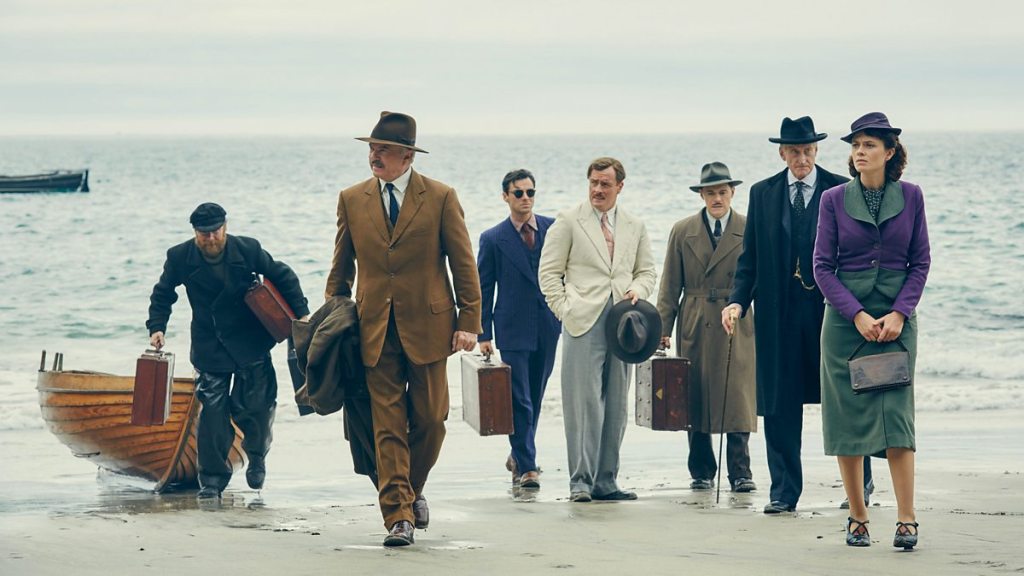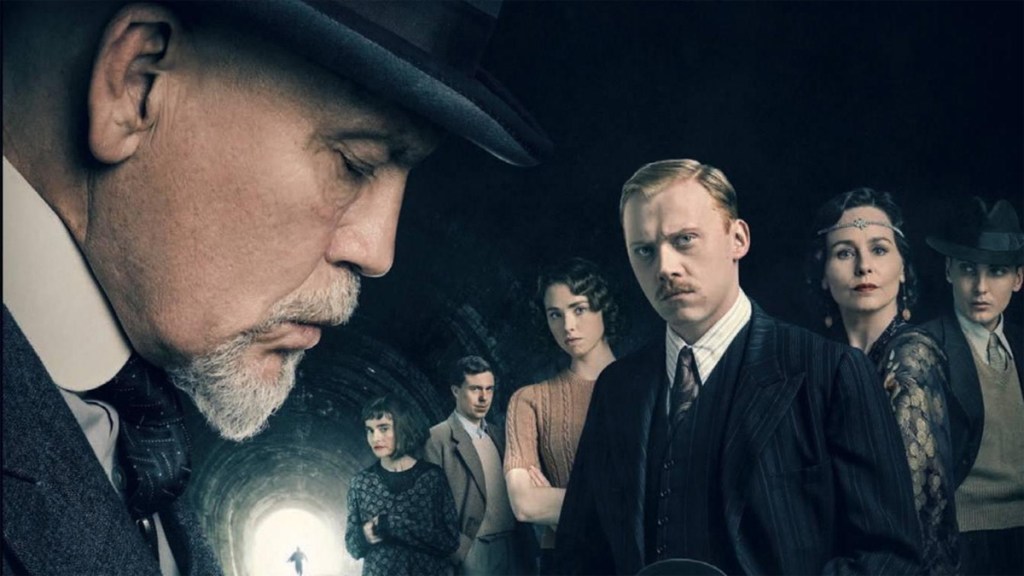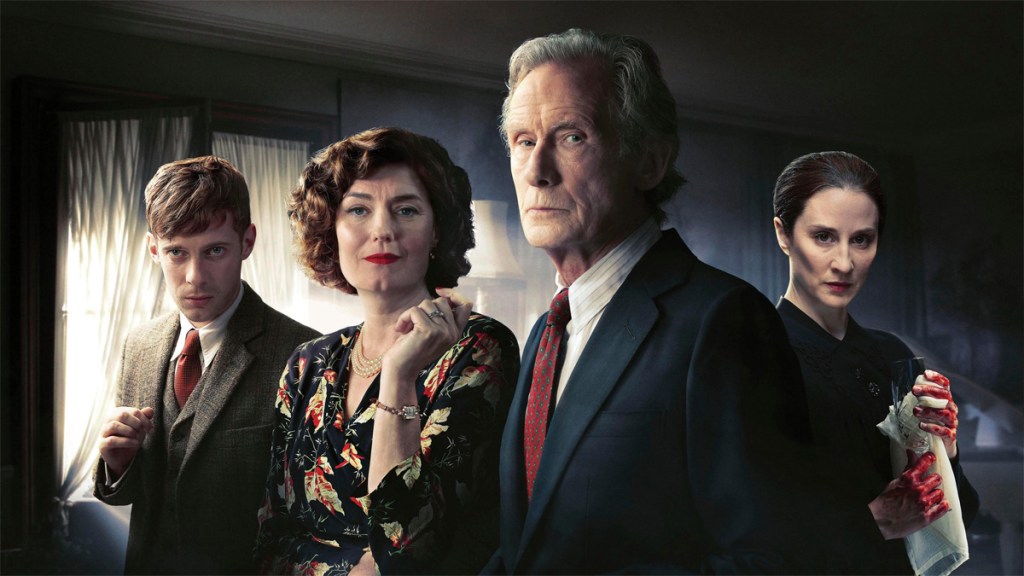Sarah Phelps interview: Agatha Christie is Always Asking ‘Are You Paying Attention?’
‘You ordinary bitch!’ snarls Sarah Phelps, ‘put your cheap knickers on and get out of my house!’ The interview hasn’t taken a strange turn; she’s laughing down the phone, quoting along with memorable lines from her BBC One Agatha Christie adaptations.
‘Oh, it brings me so much joy. It’s like The Witness for the Prosecution’s Romaine screaming in court ‘You fucking men! You fucking men!’ and then hissing at Mayhew like a cat!’ One of Phelps’ friends downloaded Andrea Riseborough’s hiss in that scene to use as her text message alert. ‘I get such a thrill out of it.’
Phelps’ screenwriting is built on thrill. There’s the all-out thrill of the story she’s telling plus the tiny power-jolts of thrill she injects into dialogue. It’s for us, but also, for her. ‘I’m the audience, me.’ If she’s laughing or crying while writing, she feels she’s getting it right.
Obsessed, joy, buzz and pleasure are words she repeats again and again talking about television, hers and other people’s. Her current TV obsession is Michaela Coel’s I May Destroy You. ‘It’s outstanding. Outstanding. I love the layers and the complexity. It’s not didactic, it’s dynamic. It’s about friendship and how the fuck we live.’
Phelps is an exhilarating interviewee. She doesn’t answer in sentences or paragraphs but detonates her thoughts – a locomotive gathering speed. Lists of questions and synonyms spill out, culminating in unarguable conclusions. She finds Agatha Christie clever, sly, cloaked, watchful, veiled, secretive. Christie’s books are brutal, violent, horrible, subversive, seditious. ‘She is not dicking around.’

Reviews of Phelps’ Christie adaptations, both from critics and viewers, fixate on her language. One described the dialogue in 2019 two-parter The Pale Horse as ‘so Phelpsian it stuck out like a sore thumb.’ What does Phelps think that adjective means?
‘Probably that someone’s done a swear,’ she laughs. In that review’s case, she’s spot-on. The quote cited is Rita Tushingham calling the devil ‘old hairy bollocks with his goat hooves’ – a treat, surely, to any ear. More seriously, she hopes that Phelpsian means ‘robust’.
‘I don’t like to think that it’s just because it’s sweary or somebody says ‘bollocks’, but there’s a twist in it somewhere. It’s kind of really ugly but elegant at the same time.’ In The Pale Horse, there’s a line describing Rufus Sewell’s character as ‘a broken, sweaty ape’ and that gave her a buzz. It’s now her Twitter bio, preceded by the legend ‘Screenwriter. Pervert. BBC Monster’, the last two inspired by choice online criticism received when her Christie adaptations aired.
In the last five years, Phelps has adapted five Agatha Christie stories for BBC One – And Then There Were None, The Witness For The Prosecution, Ordeal By Innocence, The ABC Murders and The Pale Horse. Before And Then There Were None, she’d never read Christie, having been put off by the popular take that her world was all toffs and whist-playing vicars – tea party murder mysteries wrapped cosily in a twinset and pearls.

Instead, what Phelps found in Christie was brutal, flinty-eyed judgment. She sees Christie as an observer, a recorder of pre- and post-war Englishness. ‘In The ABC Murders, she is very, very aware that there is something really unpleasant going on in England in the 1930s. She actively references the talk about foreigners and the hostility. She doesn’t make that her leading thing, she’s just absorbing it and always saying ‘Are you paying attention? I am writing about this, are you paying attention?’
Paying attention to Christie has been Phelps’ mission since And Then There Were None left her reeling. It’s the story of a group of seemingly unconnected characters summoned to a remote island where, one by one, they’re killed off according to the lines of a children’s poem. When Phelps read it, she felt existential menace. ‘This was what it was like to be standing on the edge of the world with a catastrophe rushing towards you. Here’s this unblinking, remorseless God who’s going to end your life because of the things that you’ve done.’
That’s what underpins Christie’s portrait of the English national character, she says, ‘the things that we’ve done and how we try desperately hard not to be caught.’ She describes it a preoccupation of Christie’s, and the connecting theme of her adaptations.
‘How do we hide the things we’ve done so nobody calls us to account? How do I keep my nice life and not get caught for the terrible things that I’ve done? How do I carry on being this civilised English person? How do I carry on enjoying my life? How do I carry on with my power and my wealth? How do I avoid accountability? What will we do to retain our power?’
Phelps has a theory, based on Christie’s experience as a dispensing chemist in the Voluntary Aid Detachment during the First World War, that ‘she saw the world in a really quantum way – a grain here, a grain there, you can barely see it but it makes what was known entirely unknown.’ The bounds forward in medicine that Christie witnessed would have revealed how tiny, invisible specks of dirt under a fingernail could mean the difference between life and death, and, thinks Phelps, her imagination would have been duly nurtured by that understanding.
‘I always imagine her measuring out the infinitesimal grains of pharmaceuticals, and beyond that lies the whole smashed landscape of what we thought we knew.’ Phelps takes a rare pause and, less rare, laughs at herself. ‘Of course, I could be totally talking out of my arse.’
She has another theory, based on the 1944 Broadway production of And Then There Were None. Christie was asked by a producer to make the bloodbath ending cheerier for a war-stricken audience, says Phelps. Christie did as asked, allowing two of the characters who die in the novel – Vera Claythorne and Philip Lombard – to survive and swan off together into the sunset.
‘She went ‘you want a happy ending? Okay, a child murderer who shows absolutely no remorse and a mass murderer. You want them to have a romantic, happy ending? That’s what you want? That’s what you want out of my book. Okay, you can have it. After that, her books change.’
‘I always feel that there’s a judgment from Christie about what people want, that they will forget the sin really easily to pander to their own sense of contentment. She feels like she’s scrutinising the reader. There’s always a tussle between the book that Agatha Christie wants to write and the book she knows that people want to read.’

Some see Phelps as a Christie revisionist, adding darkness, sexing up the stories and dimming down the lights, kicking in social commentary with a stiletto heeled boot. To a certain viewer, she’s a sweary witch hell-bent on destroying the thoroughgoing loveliness of good old-fashioned British stories. About murder. And serial killers. And hangings and poisonings and child death and adulterers and bludgeonings. Stories about the hell of motherhood and, to quote Phelps, ‘the quotidian savagery of marriage.’
Her adaptations are less revisionist than archaeological, I suggest. Over the decades, Christie’s writing has been built over with layers of fame and opinion and industry, and Phelps has been scraping that away to reach the bones. She likes the image. From the novels and short stories, those bones have called out to her, drawing attention to themselves through ‘absences, little things that don’t quite make sense, little misdirections, odd little details.’
Such as? ‘In Ordeal by Innocence. You’re reading it and you suddenly come across something really, really strange and wonder what the hell it’s doing there.’ Among all the bumbling policemen failing to notice things, a character fantasises about seeing his mother after a car crash with her hair lying in a puddle of oil on the Great North Road. The violence of the image exploded into Phelps’ head.
‘That’s why I had no problem with changing the killer in Ordeal By Innocence.’ It’s the story of a murdered philanthropist who’d adopted a number of children to raise in her stately home. The book’s original killer, says Phelps, made no sense. ‘By the time I’d got to where [spoiler] walked in and brained her, it makes so much sense I didn’t think anything of it. It just felt like that was what the book was telling me to do.’
‘What really killed this woman? What killed this mother? Why is this woman trying to be the perfect mother? Why is this story being told in the 1950s, where everything is supposed to be about bunting and celebration?’ Phelps took all the violence of the time and used it to tell the story she thought Christie really wanted to tell.
To do that, Phelps first had to get Christie’s characters talking to her. And when they started talking, she was often surprised – and thrilled – by what they said. Mayhew’s wife, a character she invented for The Witness for the Prosecution, screaming ‘you don’t want to be loved, you want to be forgiven!’ was one surprise. Another was Monica Dolan’s character in that adaptation being marched off to her death with the gentle protest ‘Not today, thank you, it’s not convenient.’ There was Jack, one of the grown-up adopted children in Ordeal By Innocence telling his father ‘I am your plague and I’m coming for you.’ All surprises, says Phelps. All thrills.

She imagines every detail of her characters, inside and out. Costume, posture, fears…
‘What is somebody doing when you can’t see them? What do they dream about? What wakes them up in 4 o clock in the morning absolutely cold with sweat? What is the thing that they don’t want anyone to ever find out about? What is the sole burning flame in their life, what would happen if it got extinguished? Do they expect a blow to fall and where do they expect that blow? Do they think they’re going to make old bones? A character like Bill Sykes [Phelps wrote the 2007 BBC adaptation of Oliver Twist], does he think he’s going to live much past the age of 30? Does he know that it’s coming for him? How does he hold himself, is he braced at every single moment for the charge that’s going to take him out? Has he got eyes in the back of his head? This woman, where does she think her danger is? How long did it take her to put on that smile to face the world so no-one knows that she’s about to go stark staring mad? All the time you’re thinking about that, all the time. And it’s only then that they can talk to me.’
She stops momentarily, laughing at her outpouring. ‘That sounds nuts! That sounds nuts!’ Then she keeps going.
‘You want these people to talk to you, you want to unpeel them from preconception and see their humanity and understand why they’ve done what they’ve done. Because if they’re just doing it because they’ve always done it since the book was published, then you’re not really adapting the book are you?’
‘We all think we know who Hercule Poirot is’, she says of her 2018 version of The ABC Murders starring John Malkovich as the Belgian detective, ‘but his character has got to be a mystery. Otherwise, it’s just another Poirot isn’t it? And what’s the bloody point in doing that?’
Agatha Christie’s The ABC Murders is streaming now in the UK on Acorn TV
The post Sarah Phelps interview: Agatha Christie is Always Asking ‘Are You Paying Attention?’ appeared first on Den of Geek.
From https://www.denofgeek.com/tv/sarah-phelps-interview-agatha-christie-is-always-asking-are-you-paying-attention/



